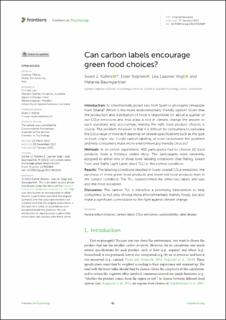Please use this identifier to cite or link to this item:
https://doi.org/10.21256/zhaw-26742Full metadata record
| DC Field | Value | Language |
|---|---|---|
| dc.contributor.author | Kühne, Swen J. | - |
| dc.contributor.author | Reijnen, Ester | - |
| dc.contributor.author | Laasner Vogt, Lea | - |
| dc.contributor.author | Baumgartner, Melanie | - |
| dc.date.accessioned | 2023-01-27T15:48:33Z | - |
| dc.date.available | 2023-01-27T15:48:33Z | - |
| dc.date.issued | 2023 | - |
| dc.identifier.issn | 1664-1078 | de_CH |
| dc.identifier.uri | https://digitalcollection.zhaw.ch/handle/11475/26742 | - |
| dc.description.abstract | Introduction: A conventionally grown kiwi from Spain or an organic pineapple from Ghana? Which is the more environmentally friendly option? Given that the production and distribution of food is responsible for about a quarter of our CO2e emissions and thus plays a role in climate change the answer to such questions and, accordingly, making the right food product choices is crucial. The problem, however, is that it is difficult for consumers to calculate the CO2e value of food as it depends on several specifications such as the type of food, origin, etc. Could carbon labeling of food circumvent this problem and help consumers make more environmentally friendly choices? Methods: In an online experiment, 402 participants had to choose 20 food products from a fictitious online shop. The participants were randomly assigned to either one of three food labeling conditions (Star Rating, Green Foot, and Traffic Light Label, short TLL) or the control condition. Results: The labeling conditions resulted in lower overall CO2e emissions, the purchase of more green food products and fewer red food products than in the control condition. The TLL outperformed the other two labels and was also the most accepted. Discussion: The carbon TLL is therefore a promising intervention to help consumers to not only choose more environmentally friendly foods, but also make a significant contribution to the fight against climate change. | de_CH |
| dc.language.iso | en | de_CH |
| dc.publisher | Frontiers Research Foundation | de_CH |
| dc.relation.ispartof | Frontiers in Psychology | de_CH |
| dc.rights | https://creativecommons.org/licenses/by/4.0/ | de_CH |
| dc.subject | Food product choice | de_CH |
| dc.subject | Carbon label | de_CH |
| dc.subject | CO2e emission | de_CH |
| dc.subject | Sustainability | de_CH |
| dc.subject | Label design | de_CH |
| dc.subject.ddc | 158: Angewandte Psychologie | de_CH |
| dc.subject.ddc | 338.927: Umweltökonomie und nachhaltige Entwicklung | de_CH |
| dc.title | Can carbon labels encourage green food choices? | de_CH |
| dc.type | Beitrag in wissenschaftlicher Zeitschrift | de_CH |
| dcterms.type | Text | de_CH |
| zhaw.departement | Angewandte Psychologie | de_CH |
| zhaw.organisationalunit | Psychologisches Institut (PI) | de_CH |
| dc.identifier.doi | 10.3389/fpsyg.2022.902869 | de_CH |
| dc.identifier.doi | 10.21256/zhaw-26742 | - |
| zhaw.funding.eu | No | de_CH |
| zhaw.issue | 902869 | de_CH |
| zhaw.originated.zhaw | Yes | de_CH |
| zhaw.publication.status | publishedVersion | de_CH |
| zhaw.volume | 13 | de_CH |
| zhaw.publication.review | Peer review (Publikation) | de_CH |
| zhaw.webfeed | PI - Umwelt- und Nachhaltigkeitspsychologie | de_CH |
| zhaw.webfeed | Angewandte Kognitionspsychologie | de_CH |
| zhaw.author.additional | No | de_CH |
| zhaw.display.portrait | Yes | de_CH |
| zhaw.monitoring.costperiod | 2022 | de_CH |
| Appears in collections: | Publikationen Angewandte Psychologie | |
Files in This Item:
| File | Description | Size | Format | |
|---|---|---|---|---|
| 2023_Kuehne-etal_Can-carbon-labels-encourage-green-food-choices.pdf | 1.43 MB | Adobe PDF |  View/Open |
Show simple item record
Kühne, S. J., Reijnen, E., Laasner Vogt, L., & Baumgartner, M. (2023). Can carbon labels encourage green food choices? Frontiers in Psychology, 13(902869). https://doi.org/10.3389/fpsyg.2022.902869
Kühne, S.J. et al. (2023) ‘Can carbon labels encourage green food choices?’, Frontiers in Psychology, 13(902869). Available at: https://doi.org/10.3389/fpsyg.2022.902869.
S. J. Kühne, E. Reijnen, L. Laasner Vogt, and M. Baumgartner, “Can carbon labels encourage green food choices?,” Frontiers in Psychology, vol. 13, no. 902869, 2023, doi: 10.3389/fpsyg.2022.902869.
KÜHNE, Swen J., Ester REIJNEN, Lea LAASNER VOGT und Melanie BAUMGARTNER, 2023. Can carbon labels encourage green food choices? Frontiers in Psychology. 2023. Bd. 13, Nr. 902869. DOI 10.3389/fpsyg.2022.902869
Kühne, Swen J., Ester Reijnen, Lea Laasner Vogt, and Melanie Baumgartner. 2023. “Can Carbon Labels Encourage Green Food Choices?” Frontiers in Psychology 13 (902869). https://doi.org/10.3389/fpsyg.2022.902869.
Kühne, Swen J., et al. “Can Carbon Labels Encourage Green Food Choices?” Frontiers in Psychology, vol. 13, no. 902869, 2023, https://doi.org/10.3389/fpsyg.2022.902869.
Items in DSpace are protected by copyright, with all rights reserved, unless otherwise indicated.